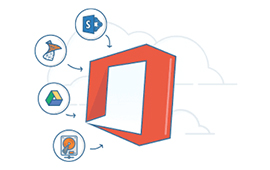Microsoft Office 365 is the subscription to run Microsoft Exchange in a data centre that is managed and maintained by Microsoft. Because Microsoft manages the data centre, it removes the need for small business owners to facilitate and maintain an in-house/physical server to run Microsoft Exchange.
There are 10 great reasons for Businesses to switch to Office 365:
1. Turn capital expenditure into operating expenses.
A business will no longer need to fund the initial large capital outlay to acquire a server, the Exchange licenses, the implementation cost and any infrastructure upgrade in order to roll out Exchange across the organisation. It is replaced by a monthly subscription fee based on the number of accounts. Better still, if you are a not-for-profit organisation, you can subscribe to the E1 plan free of charge.
2. Easy to set up and roll out.
Without having to roll out a server and the associated infrastructure and software, the initial set up can now be done in hours.
3. High reliability.
Microsoft Office 365 has a guaranteed uptime of 99.9%. Microsoft has the most advanced data centres with a redundancy that most businesses can now leverage such as data replication, redundant hardware, temperature and humanity control, multiple T1 internet links and power generators.
4. Large capacity.
By default, the total mail store in a Microsoft Small Business Server Exchange is 75 GB for the entire organisation. From our experience, the average mailbox size for an employee over a 2 year period is around 2 GB per account. In Office365, each user is allocated 50 GB of
storage. This means the need to archive emails will become very small.
5. Ease of maintenance.
The maintenance will be performed by Microsoft. Therefore this removes the need for an IT specialist to maintain your Exchange server, your backups and anti-spam etc.
6. Anti-spam.
Most businesses that run their own Exchange mail server would have been subscribing to some anti-spam filtering solutions. The anti-spam solution is included as part of the Office 365 offering.
7. Disaster Recovery.
The most difficult and time-consuming component in a disaster recovery situation is the recovery of the Exchange database. With this critical component removed from your infrastructure, it reduces the overall risks to the organisation.
8. Accessibility
As long as you have an internet connection you can access your emails and files from anywhere and anytime. This is great news for remote
office workers.
9. Compatibility
Office 365 supports all Windows and Macs, Desktops and Handheld Devices.
10. Flexibility
Microsoft offers a number of great plans with flexible licence types and terms. Your IT provider can guide you through what you should
be aiming for.
Some points to consider on implementing Office 365.
For a small business or a start up, migrating to Office 365 can be very straight forward. For larger enterprises, implementing Office 365 should be treated as any other major system rollout. It requires detailed planning, from an experienced IT provider that can provide a robust communication plan and excellent project management skills to ensure a smooth transaction.
Please also note that in order to use Office 365 effectively you do need to have the latest Microsoft Office software. This software can be purchased outright or as part of the Business Premium subscription.
Security is a hot topic right now, and you can feel safe in the knowledge that Microsoft’s data centres are more secure than almost all business networks. However, every business is vulnerable if they don’t possess effective security measures irrespective of whether they are
running the IT services in-house or in the cloud like Office 365. Basic security measures that each business should include are:
- A good commercial grade firewall to protect from external attacks.
- Anti-virus protection on all computing devices.
- A Strong password policy.
- Internal IT policy with acceptable internet and computer usage.
- User education on computing security.
If your business is looking at migrating to Office 365; make sure the IT Company you are working with has both excellent references and relevant experience.





